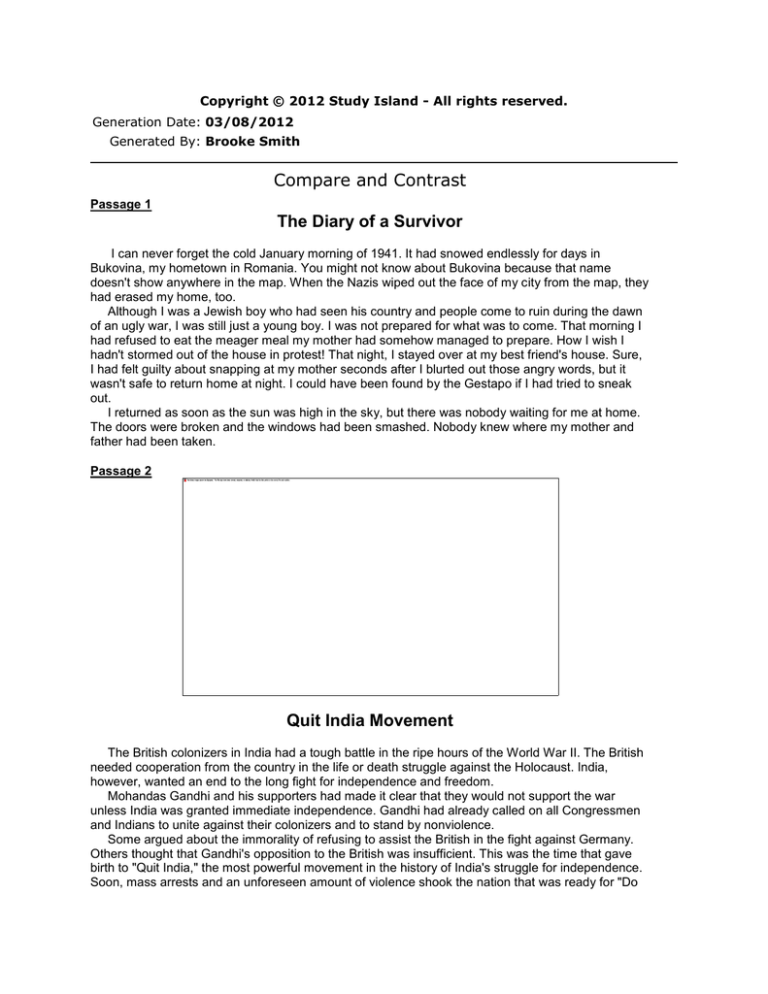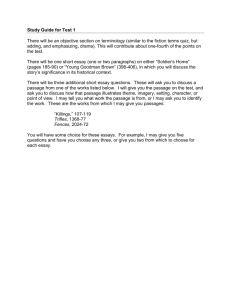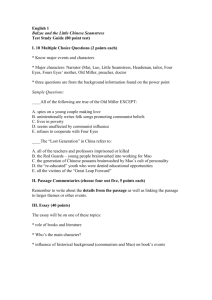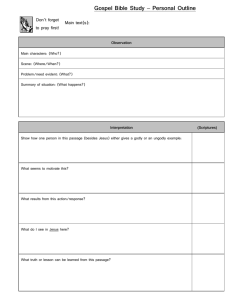
Copyright © 2012 Study Island - All rights reserved.
Generation Date: 03/08/2012
Generated By: Brooke Smith
Compare and Contrast
Passage 1
The Diary of a Survivor
I can never forget the cold January morning of 1941. It had snowed endlessly for days in
Bukovina, my hometown in Romania. You might not know about Bukovina because that name
doesn't show anywhere in the map. When the Nazis wiped out the face of my city from the map, they
had erased my home, too.
Although I was a Jewish boy who had seen his country and people come to ruin during the dawn
of an ugly war, I was still just a young boy. I was not prepared for what was to come. That morning I
had refused to eat the meager meal my mother had somehow managed to prepare. How I wish I
hadn't stormed out of the house in protest! That night, I stayed over at my best friend's house. Sure,
I had felt guilty about snapping at my mother seconds after I blurted out those angry words, but it
wasn't safe to return home at night. I could have been found by the Gestapo if I had tried to sneak
out.
I returned as soon as the sun was high in the sky, but there was nobody waiting for me at home.
The doors were broken and the windows had been smashed. Nobody knew where my mother and
father had been taken.
Passage 2
Quit India Movement
The British colonizers in India had a tough battle in the ripe hours of the World War II. The British
needed cooperation from the country in the life or death struggle against the Holocaust. India,
however, wanted an end to the long fight for independence and freedom.
Mohandas Gandhi and his supporters had made it clear that they would not support the war
unless India was granted immediate independence. Gandhi had already called on all Congressmen
and Indians to unite against their colonizers and to stand by nonviolence.
Some argued about the immorality of refusing to assist the British in the fight against Germany.
Others thought that Gandhi's opposition to the British was insufficient. This was the time that gave
birth to "Quit India," the most powerful movement in the history of India's struggle for independence.
Soon, mass arrests and an unforeseen amount of violence shook the nation that was ready for "Do
or Die" in the cause of freedom.
1. How is this excerpt from The Diary of a Survivor reflective of the historical period
described in Quit India Movement?
A. Both focus on Indian freedom fighters.
B. Both discuss a city that no longer exists.
C. Both show young boys' views on wars.
D. Both are set in the same time period.
2. A student wants to compare these passages for a research paper. How should
the student best explain the difference between the two views of the World War
II?
A. Passage 1 shows how teenagers should behave during a big war; Passage 2 shows
how adults must behave during a war.
B. Passage 1 shows how the war created a city on the map; Passage 2 shows how the
war united a country against the Nazis.
C. Passage 1 shows unusual problems of families during a war; Passage 2 shows the
universal struggles of a nation in a war.
D. Passage 1 shows the effect of the war on an individual person; Passage 2 shows the
effect of the war on a colonized nation.
Passage 1
The Revival of Stephen Crane
Although Stephen Crane was an important literary figure in American literature at the time of his
death, he was nearly forgotten for the next two decades. When critics revived interest in his life and
work, Stephen Crane was rediscovered. The vividness of description and intensity found in Stephen
Crane's fiction and poetry intrigued many writers and critics alike. Many related to the themes of fear,
spiritual crisis, and isolation found in his works. Crane's The Red Badge of Courage became an
American classic. He became renowned for his unconventional and ironic poetry and short stories,
such as "The Open Boat," "The Blue Hotel," "The Monster," and "The Bride Comes to Yellow Sky."
Not only did Stephen Crane leave a deep impression on twentieth century writers such as Ernest
Hemingway, but he also inspired the Modernist and the Imagist writers and artists.
Passage 2
A MAN SAID TO THE UNIVERSE
by Stephen Crane
A man said to the universe
"Sir, I exist!"
"However," replied the universe,
"The fact has not created in me
A sense of obligation."
3. Which of these is an idea found in both the passage and the poem?
A. the poet's near forgotten works
B. the theme of lack of obligation
C. the topic of courage in crisis
D. the poet's ironic worldview
4. Which statement best compares the author's purpose in The Revival of Stephen
Crane and the poet's purpose in the poem?
A. The first passage informs about the poet's works; the poem reveals the poet's
emotions.
B. The first passage instructs the reader to read more about the poet; the poem shows
an opinion.
C. The first passage describes many people's lives; the poem only describes the poet's
life.
D. The first passage narrates a story about the poet; the poem shows a universal point
of view.
Passage 1
Global News
This year's Nobel Peace Prize was given to Bangladeshi economist Muhammad Yunus and his
pioneering Grameen Bank. Yunus was awarded the prize for providing seemingly insignificant loans,
known as microcredit, and helping millions come out of poverty.
It is to be noted that Yunus's efforts have made it possible for many poor people to buy cattle or
mobile phones they needed to get ahead in life and in small business. Grameen Bank has especially
proved helpful to impoverished people who do not qualify to get big loans from banks.
Mr. Yunus has announced that he will use part of the 1.4 million dollars of the prize money to
create a company that makes low-cost, high-nutrition food for the poor. The rest of the money will be
used to set up and an eye clinic for the poor in Bangladesh.
Passage 2
A Citizen's Blog
It is not every day that we hear about uplifting things that actually make a difference in this world.
Today, I read about an economist who lifted millions out of poverty. Sounds good in a political
campaign speech, right? Well, it actually happened.
Mohammad Yunus of Bangladesh established a bank that makes it possible for many poor
people to take out loans. His work and vision were rewarded with the Nobel Prize. I have to say, the
money is going to the right place. This man can use the prize money for other cool projects like his
bank and maybe lift an entire country.
Next time I come up with a great idea, I am going to at least give it a shot. Who knows, I just
might come up with a solution to end global warming or pollution or world hunger?
5. Which idea is found in the blog but not in the news article?
A. medical facilities for the poor
B. using money for good causes
C. lifting people out of poverty
D. disillusionment with politicians
6. Which of these statement best compares the information in both passages?
A. The news article relates to universal ideas of economy; the blog shows a historical
moment.
B. The news article offers opinions of Mohammad Yunus; the blog only shows one
person's story.
C. The news article is biased against poverty; the blog reveals the author's view on
world peace.
D. The news article informs with a formal language; the blog expresses feelings and
opinions.
Passage 1
The Emerging of Kasia
Kasia could not believe she was actually boarding a flight to America. Only yesterday, she was
sitting on the floor in the attic with dust all over her hands and the white cotton dress. The dress was
her grandmother's last gift to Kasia. As Kasia moved her fingers around the old, greasy, and dusty
globe, she thought of her grandmother who had put it there.
"Darling, one day you shall see the world," Kasia's grandmother, Justina, had said, "It is your
fate." She had stood in the same attic with Kasia years ago. "Be sure to go to America, and write to
me in English," Justina would say dreamily. Now, America was Kasia's dream. She thought about
her university in New York.
"How will people understand me there?" Kasia spoke her fear out loud. From that moment, Lublin
and everything Polish was always dearest to Kasia's heart.
Passage 2
What was Ahead?
Unable to ignore his mother's routine plea, Deepak decided to seek an astrologer. He had little
trouble finding one because there was a fortune-teller of some sort in every nook of the city. He
decided to visit a man with the most curious-sounding name.
"Son, do not seek after what your heart desires the most," the man said as Deepak entered the
room that smelled of incense and saffron. "It is not your destiny," he continued without asking
Deepak any questions."You have great athletic abilities. Why don't you play cricket?" the astrologer
asked, "Don't you want to be famous?"
Deepak's eyes were focused on the view outside the window. He had forgotten all about the days
when he used to play cricket. Deepak did not care about the astrologer's prophecies. He only
wanted to become a scientist.
7. Which universal theme is most apparent in both passages?
A. contemplating over the future
B. a person's loss of innocence
C. a person's struggle with nature
D. the effects of scientific progress
8. How does the idea of fate differ in each of the passages?
A. Kasia's fate is leaving her home country forever; Deepak's fate is staying in his
country.
B. Kasia does not believe in destiny and fate; Deepak believes in astrology and fortunetelling.
C. Kasia follows what she thinks is her fate; Deepak does not want to follow his foretold
fate.
D. Kasia learns about her fate in a prophecy; Deepak's fate is shown to him by his mom.
Passage 1
Back to the Future
Heath had come clean. The way of life he had led until now couldn't satisfy him. The day he
decided to mend his mistakes was the day his mother said she still loved him. Heath knew, no
doubt, that his family was waiting for him to turn around. Even in the darkest hours of the
disappearance, Heath had not lost his faith in his family. Then, he had lost faith in himself and had
walked out in anger. Heath had become lonely for the love that he had found smothering. After
nights on the footpath, Heath knew what it took for his father to put a roof over his head. Suddenly, it
all made sense. Heath was himself again. He felt newer and surer of himself like never before.
Passage 2
Not Drowning, but Waving
The day I almost drowned had saved my life.
I saw the world inside the waters' sphere.
Submerged I thought that I had lost it all,
and things had ended after one fateful fall.
But then, two hands reached for my shaky limbs.
I was pulled up; I made it to the shore.
I thank my life, more than I thanked before.
9. How are the archetypal settings in the poem and the story alike?
A. They both take place in the wilderness where the hero faces disillusionment.
B. They both take place in the desert where the hero goes on a spiritual quest.
C. They both take place in the underground from which the hero emerges.
D. They both take place in the city where the hero delves into the subconscious.
10. How is the poem similar to the passage?
A. It is written to inform.
B. It is narrative in style.
C. It is written to persuade.
D. It is about family values.
Passage 1
Lessons from My Grandfather
Much of what I learned about life was from my grandfather. He was an old man who told stories
and asked questions. When I went to visit him, he would ask me about my dreams and fears. He
would spit a little as he had started to lose a few teeth. Then, my grandfather looked into the horizon
and spoke to me. His voice seemed to drift from the clouds, and it carried words of ancient wisdom.
My grandfather taught me about believing in self. "What you are most afraid of," he once said, "is the
fear of failure."
Passage 2
An Expert
Miss Nina Kaminski was on a vacation on the beach when she spotted Alisa. It was a beautiful
day, and Alisa was fighting the unruly waves on her surfboard. Nina had never seen anyone else
who could maneuver on the water like this young girl. And Nina knew how good Alisa was, as she
had surfed professionally for years. Nina saw her long lost youth and energy in Alisa. She knew it
was time to help someone maneuver their way into the world of athletics.
11. Which is a universal theme found in both passages?
A. The young can always learn from their elders.
B. When in doubt, always listen to your heart.
C. People often lose their sense of wonder with age.
D. It is easier to lose than to keep on working hard.
12. Which of these is an archetypal character found in both passages?
A. the blind seer
B. the earth mother
C. the temptress
D. the mentor
Passage 1
Celebrating a Leader
Mao Zedong is considered a highly regarded founding leader of the People's Republic of China.
He was a great revolutionary and strategist who transformed China. Mao led China to victory in the
Chinese Civil War and turned the country into a major power. Mao put an end to two decades of
international and civil war and lifted China through his policies. When China became a republic on 1
October 1949, Mao became the Chairman of the People's Republic of China. Mao is also considered
one of the most influential poets of modern China. An avid poet and calligrapher, Mao wrote
traditional Chinese verses. His poetry is part of mandatory reading in Chinese elementary schools.
Passage 2
The Truth behind Mao
Many historians and academics criticize Mao Zedong's political career. They claim his social and
political programs only harmed China's domestic progress. Mao's "The Great Leap Forward"
program and the Cultural Revolution only led the country backwards. Critics argue that these
programs hurt China's culture, society, and economy. Mao's land reform movement took away lifesavings from many landowners. Mao ran numerous campaigns to suppress his political enemies.
Historians remind us that Mao ordered mass killings of many people who did not support his
revolution. Many of Mao's enemies were publicly executed. Mao also damaged China's relations
with the rest of the world.
13. Which of these is a universal idea found in both passages?
A. a stable economy
B. a changing nation
C. a beloved leader
D. an unfair world
14. Which of these best describes the similarities between the two passages?
A. Both passages describe the Chinese Civil War.
B. Both passages portray Mao as a literary figure.
C. Both passages discuss Mao's influence in China.
D. Both passages show China's foreign relations.
15. When comparing the purpose of these passages, which of these best describes
the difference?
A. Passage 1 glorifies Mao Zedong; Passage 2 criticizes Mao Zedong.
B. Passage 1 is biased about Mao; Passage 2 is persuasive about Mao.
C. Passage 1 informs about Mao; Passage 2 narrates a story about Mao.
D. Passage 1 is in opposition of Mao; Passage 2 is neutral about Mao.
Passage 1
Graphology
The study and analysis of handwriting has intrigued people for centuries. One such branch of
knowledge that approaches handwriting from the view of human psychology is known as
graphology. Graphology is also used in medicine to help in the diagnosis and tracking of brain and
nervous system diseases. However, the term "graphology" is not used in the same sense in forensic
science.
Graphology is based on the study of writing forms as affected by the central nervous system.
Since a person's muscular movements are controlled by the central nervous system, the writing
changes based on his or her state of mind. For example, when a person is finding it difficult to write,
he or she uses simpler forms of letters. Graphologists claim that things that affect a person's life
contribute to the variations in his or her writing.
Graphology is a controversial field of study. Much of the supporting evidence comes from
people's accounts of personality evaluation. However, studies have not been able to prove the
supporters' claims.
Passage 2
Notes at the Senior Center
by A. Gautam
Every evening after school, as Tina stopped by the senior center to check on one old lady or the
other, she found an interesting note stuck on the common fridge. Tina always studied the notes with
utmost curiosity. The women had the most beautiful handwriting, and they often forgot to sign their
name on the yellow sticky note. Tina could tell by now who had written to her this time based on the
content of the message.
Tina started with the longest note, "Don't worry about the book from the library. My son will bring
something to read this Saturday." Mrs. Rosenbaum, as Tina had discovered, gave her Y's a long
cursive tail. The commas were almost too thin to be noticeable. The next note read, "Some cake for
you inside the fridge. You'll love it Tinisha." Only Mrs. Manisha called Tina by that name and always
baked something sweet for the other ladies. Besides, Mrs. Manisha gave her alphabets the roundest
shapes. One could never tell that she was as skinny as a report card paper.
16. When comparing the purpose of these passages, which of these best describes
the difference?
A. Passage 1 instructs on how to read handwriting; passage 2 teaches the reader how
to read senior citizens.
B. Passage 1 describes the testimonial of many people; passage 2 presents the point
of view of one person.
C. Passage 1 informs the reader about graphology; passage 2 entertains the reader
with a story about notes.
D. Passage 1 narrates the account of a handwriting reader; passage 2 describes the
tale of a wrong analysis.
17. Which of these best describes how both passages are alike?
A. Both share a similar setting and plot.
B. Both offer an analysis of handwriting.
C. Both describe muscular movements.
D. Both show the importance of evidence.
Passage 1
Memories of Digging Gold
Santiago was not going to play in his backyard today. His mother could not be home to take care
of him. Santiago was big enough to understand things but not old enough to be left without
supervision. So, Santiago held on to his mother's index finger and tried to catch up with her fastpaced steps. They were going to the gold fields to take lunch to his father who had been mining day
and night.
Santiago's family had traveled for days on foot to get to California. During the journey, he wished
his mother carried him on his back like his father used to. When Santiago finally made it to the fields
he saw swarms of men, women, and children who were busy digging. Before his mother knew it,
Santiago was already far away from her. He was pulled by a strange force to a group of kids. Each
of the kids spoke a different language so one could not understand the other. It was years before
Santiago understood that he had met kids who belonged to China, Chile, and many Native American
tribes.
Passage 2
A Star Rises
Jesse Owens was used to a tough life. He was born in rural Alabama to sharecroppers who
struggled to fight hunger each harvest season. When Jesse was a child, he ran around the farm in
his spare time. He said it was something that made him feel powerful, and it was something he could
do alone. Jesse also learned to read and write in a one room school house.
When Jesse's family moved to Ohio seeking a better life, he learned how to survive in the ghetto.
He delivered groceries, loaded freight cars, and worked in a shoe repair shop while he still attended
school. Jesse's luck was about to change when he met Coach Riley. Riley saw that Jesse could run
like magic. The making of a legend began in Cleveland East Technical High School's humble athletic
department when America was fighting the Great Depression.
18. Which idea is found in both passages?
A. a glimpse of a struggling family
B. a person fighting discrimination
C. a young boy learning to read
D. the making of a famous person
19. Which of these best compares the difference between the historical settings of
the passages?
A. Passage 1 takes place when most people were farmers; Passage 2 takes place
when people explored other jobs.
B. Passage 1 takes place during the California Gold Rush; Passage 2 takes place
during the Great Depression.
C. Passage 1 takes place during America's discovery; Passage 2 takes place during
the slavery of Native Americans.
D. Passage 1 takes place when America was prosperous; Passage 2 takes place when
America ended a war.
Passage 1
An Introduction to Robert Frost
Robert Lee Frost was an American poet who used simple language to examine complex
philosophical themes. Although he was born in San Francisco, he lived most of his life in New
England and wrote about rural life in early 1900s. It was the command of American colloquial speech
to write universal truth that made Frost an important national figure. By the 1920's, Frost had
become the most celebrated poet in America. Frost was considered the American lyric voice. He
was honored as a Poet Laureate, and awarded four Pulitzer Prizes, among other recognitions.
Although Frost suffered in life and lost his important family members, he left verses that continue to
give joy to readers.
Passage 2
My November Guest
by Robert Frost
My Sorrow, when she's here with me,
Thinks these dark days of autumn rain,
5
Are beautiful as days can be;
She loves the bare, the withered tree;
She walks the sodden pasture lane.
Her pleasure will not let me stay.
She talks and I am fain1 to list:
She's glad the birds are gone away,
10
She's glad her simple worsted2 gray
Is silver now with clinging mist.
15
The desolate, deserted trees,
The faded earth, the heavy sky,
The beauties she so truly sees,
She thinks I have no eye for these,
And vexes me for reason why.
20
Not yesterday I learned to know
I gazed—and gazed—but little thought
What wealth the show to me had brought:
But it were vain to tell her so,
And they are better for her praise.
1willing
2woolen
fabric made from twisted yarn
20. Which statement best compares the author's purpose in "An Introduction to
Robert Frost" and the poet's purpose in the poem?
A. The first passage offers views of many people's lives; the poem describes one
person's life.
B. The first passage relates universal experiences; the poem reveals universal truths.
C. The first passage persuades readers to accept opinions; the poem shows a
historical moment.
D. The first passage informs with real-life details; the poem appeals to the reader's
emotions.
Copyright © 2012 Study Island - All rights reserved.







